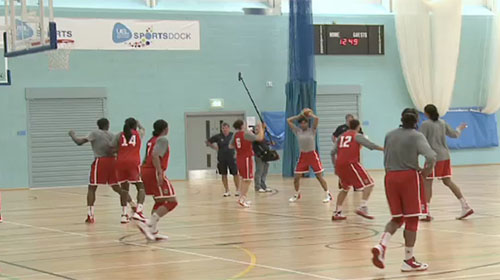Cronkite News has moved to a new home at cronkitenews.azpbs.org. Use this site to search archives from 2011 to May 2015. You can search the new site for current stories.
Despite success, Women’s Basketball misses spotlight
LONDON – The U.S. women’s basketball juggernaut went for its fifth straight Olympic gold medal Saturday.
The streak is longer than the more celebrated men’s team – but is anybody paying attention?
“I think winning a gold would be a pretty good reminder that you have the best basketball team in the world,” Phoenix Mercury star Diana Taurasi said. “And I think that’s something to be really proud of.”
Only a dozen media attended the final women’s practice before the gold medal game, in contrast to the nearly 50 present at the men’s practice the day before.
“I think that’s just a culture thing that’s buried deeply in other things that goes beyond the sport of basketball,” Taurasi said. “It doesn’t sound like its going to change. Who changes it? The people writing the stories and the people talking about it.”
Team USA Coach Geno Auriemma said the women don’t get enough coverage or credit for their performances.
“When you win as much as this program has won other the last 20 years, I think the natural tendency is to take it for granted,” Auriemma said. “Maybe it’s OK that the biggest story is if we lose. You can’t manufacture [coverage]. You can’t demand it and you can’t create it.”
The USA women’s team went into Saturday’s game with six Olympic gold medals, one silver and eight world championship titles. That’s more than any other basketball-playing country in the world, by far.
“I’d rather talk about what we’ve done than what we don’t get,” Taurasi said. “I guess it’s up to the people at home and the people around the world to value it for what they think is important and what’s not important. To us, it’s important.’’
Who controls the coverage? TNT sports reporter and NBA TV analyst David Aldridge said that’s ambiguous.
“Does the coverage drive the interest or does the interest drive the coverage?” he said.
Aldridge said while he does not think the coverage is up to par, it is improving.
“It’s not where it should be, but I’m not sure that the old way of thinking and doing things is what’s going to work anyway,” Aldridge said. “I’m not sure that you need to have a women’s beat reporter, just have a reporter. There are so many different outlets now that that whole sense of, ‘If we’re not in The New York Times we’re not important,” outlook, it’s not true anymore.
“So they can kind of create their own following now in terms of what they do and who covers them. And they can do it really on a micro-level and be really relevant and have very devoted followings and that leads to monetization and growing the coverage.”
Monetization is an increasingly critical issue when discussing women’s basketball because the future of the WNBA is in question.
Auriemma, however, is optimistic.
“For that league to last for as long as it’s lasted, that’s a hell of a testament to its organization and to the players that play in that league every year,” he said. “It’s really, really something because every other women’s league that’s tried to make it in the United States has folded. I think the WNBA has done an unbelievable job up to this point and I don’t think that they can’t keep doing it.”








